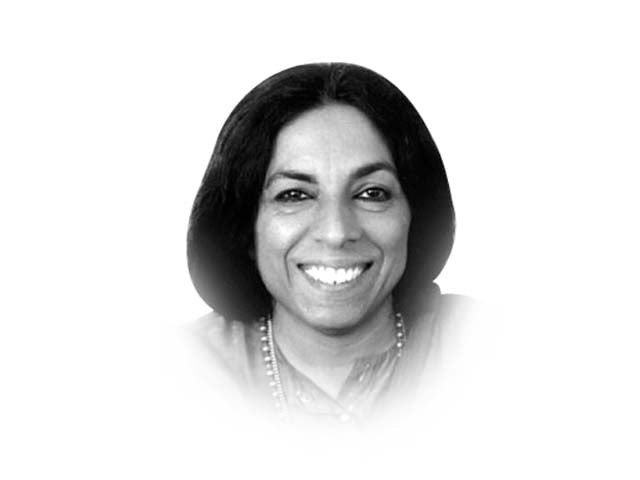Reading and reciting in Jaipur
Among the major attractions at the Jaipur Literature festival every year are the large number of Pakistani authors.

And that it certainly will. For many book lovers, the JLF has become something of an annual pilgrimage. Now in its sixth year, the festival began modestly, as a two-day event focusing on books within the larger Jaipur Virasat festival that celebrated the historical and cultural heritage of Jaipur. Today, pushed by festival directors Namita Gokhale and William Dalrymple, the JLF has become one of the most significant literary festivals, not only in India but internationally.
“Who’d have thought it would grow like this?” says a regular visitor, “I’ve been coming here for three years now and it just gets bigger and better. I’ve got wise now and I book my room for the following year each time.” The size and scale is what provides both the excitement and the challenge. For the organisers, this year showed that crowd management was something that needed attention — Sanjoy Roy said more space would be added next year and better systems introduced to keep the ‘traffic’ flowing smoothly.
In the literary world, publishers and writers who regularly sound the death knell of the book can’t really understand what’s happening at the festival. Not only are there thousands of visitors, but virtually every session, whether it is a conversation, or a poetry reading, or a panel discussion, is crowded. A poet from Poland, a doctor from Palestine, a writer from Italy, an academic from Kerala, all draw large crowds and when they speak, people listen with attention and jump in with questions. Doomsday scenarios and predictions about the lack of reading, the death of the book, seem a far cry here. “What’s important,” say the directors, “is that the festival features well-known writers [Nobel laureates among them] but it also provides a platform for new writers.”
Among the major attractions at the festival this year — and every year — were the large number of Pakistani authors. Last minute uncertainties about visas and permissions notwithstanding, a number of writers did make it and, judging from the crowds that flocked to their sessions, it’s clear that literature and stories can create and sustain bonds that politics and governments are bent upon destroying.
2011 was also the first year of a new award for South Asian writing, instituted by the main funders of the festival, the DSC group. Carrying a purse of $50,000, the DSC award went to a Pakistani author, HM Naqvi, for his novel Home Boy. Of the four venues at the festival where simultaneous sessions take place, the front lawn is seen as the most important, and it was the front lawn that hosted Mohsin Hamid, another Pakistani writer, in a one-hour conversation with journalist and writer Chandrahas Choudhry. Then there were sessions featuring Shariyar Fazli, Muneeza Shamsie, Kamila Shamsie and Zaheda Hina. And Moni Mohsin, columnist and writer, was one of the five members of the jury for the award.
All sessions featuring Pakistani writers drew large crowds. Despite the recent — and relative — opening up of travel and communication between the two countries, there is still a huge curiosity among people about the ‘other side’. So no matter how hard moderators tried to limit audience questions to literary matters, politics inevitably entered the picture. While stories of friendship and enduring connections were dominant, not all sessions were without acrimony. MJ Akbar’s somewhat damning presentation on Pakistan (based on his recent book Tinderbox) would have called up many angry reactions had the moderator allowed people to speak.
While the focus this time was on writing in the Indian languages, there were writers from Africa (Chimamanda Ngozi Adichie from Nigeria being one of the star attractions and the Middle East.] In a moving session that left not a dry eye in the room, Palestinian doctor and writer Izzeldin Abuelaish held everyone spellbound with his story of compassion and his rejection of the politics of hate.
The question uppermost in everyone’s mind was: do people actually read so much that they are attracted by the presence of all these writers? As usual, there isn’t an easy answer to this kind of question. But the indications at Jaipur — which bode well for other literary festivals — were positive. Diggi Palace, the family-run heritage hotel that is the festival venue, does not provide the usual ‘mela’ environment. There are no ferris wheels, no other entertainments, and only a handful of stalls offer food, or tea and coffee. So apart from literature and writers, there’s nothing else on offer. The conclusion, then, must be that if people come, they come because of literature — which has to be a good thing.
Already gearing up for 2012, the festival directors are both excited and apprehensive. There were some rumblings among visitors and authors about the festival’s sources of funding, some concern among people about crowd management, and curiosity about how things will shape up the following year. “We’re looking into all these things,” say the directors, “and have some ideas. But the real challenge is to stay rooted and not get carried away by the hype.” Wise words indeed.
Published in The Express Tribune, February 5th, 2011.














COMMENTS
Comments are moderated and generally will be posted if they are on-topic and not abusive.
For more information, please see our Comments FAQ